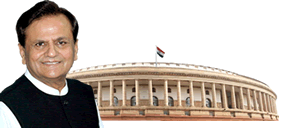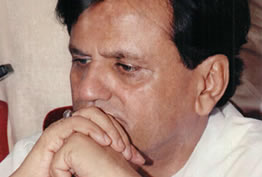Ahmed Patel went on to represent Bharuch in the Lok Sabha for the subsequent two general elections. After his first victory in the Lok Sabha elections, he became the President of the Gujarat Youth Congress and served in that position until 1981. He also was the person from the minority community to head the state’s youth congress. During his five year tenure in the State Youth Congress he played a key role in implementing the five point agenda of Shri Sanjay Gandhi to promote adult literacy.
His non controversial personality and respect among st party workers resulted in his rapid ascension within the Congress party. In 1982 Ahmed Patel made a formal entry in the party’s central organization by becoming its Joint Secretary. During his tenure as Joint Secretary he along with Shri Rajiv Gandhi initiated a mass contact program in Punjab, which was then reeling under terrorism.
In the 1984 general elections, Ahmed Patel won the Bharuch Parliamentary constituency for a second consecutive time with a margin of over 1 lakh votes. When Shri Rajiv Gandhi became the Prime Minster that year, Ahmed Patel briefly served first as his Parliamentary Secretary and was responsible to liaise between the Prime Minister’s Office and the party.
“Universal healthcare and quality education are the two key pillars of a modern society.”
The same year he also became the General Secretary of the All India Congress Committee, in charge of strengthening party affiliates such as Seva Dal and National Students Union of India (NSUI).
Ahmed Patel was asked to head Party’s Gujarat unit (GPCC) in 1986. During his two year tenure, he mobilized party cadres during the Gujarat drought via a specially formed trust, the Gujarat Rahat Samiti. It was during this time that he pioneered the idea of crowd sourcing funds for political purposes, a concept which uncommon in Indian politics. Under his leadership the trust raised over Rs 2.5 crore in 1988 by hosting Amitabh Bachchan concerts. The trust then used the record proceeds to adopt cattle affected by the severe drought. In 1987 in his capacity as Member of Parliament, Ahmed Patel was proactive in setting up the Narmada Management Authority to monitor the Sardar Sarovar Project.
On the occasion of Jawaharlal Nehru’s birth centenary celebration, Ahmed Patel was appointed as the secretary of the Jawahar Bhavan Trust in 1988. He was asked by the then Prime Minster Shri Rajiv Gandhi to supervise the construction of Jawahar Bhavan in New Delhi’s Raisina Road, a project which had been stalled for more than a decade. In a record one year, just in time for Nehru’s birth centenary celebrations ,Ahmed Patel successful erected the Jawahar Bhavan, which was at that point a highly futuristic building equipped with computers, telephones and energy saving air conditioners. The building was constructed using funds from Congress lawmakers and partly crowd funded through one day cricket matches.
The rise of Mandal and Mandir politics dealt a temporary blow to Ahmed Patel’s political career in 1989. During that year’s general elections he lost his Bharuch seat. The following year he once again made an unsuccessful attempt to get elected into the Rajya Sabha. Finally in 1993, he managed to enter Rajya Sabha and has been a member ever since.
In 1992, Ahmed Patel became one of the youngest members to be elected to the Congress Working Committee, the party’s highest decision making body. Between 1992 and 2001, he held key positions in the party such as General Secretary and Treasurer. As General Secretary, Ahmed Patel was responsible for overseeing the party’s units in Orissa, Punjab, Haryana and Delhi. During his tenure, the Congress came to power in the states of Orissa, Punjab and Delhi.
“List mile connectivity should be the primary focus of any government policy.”




